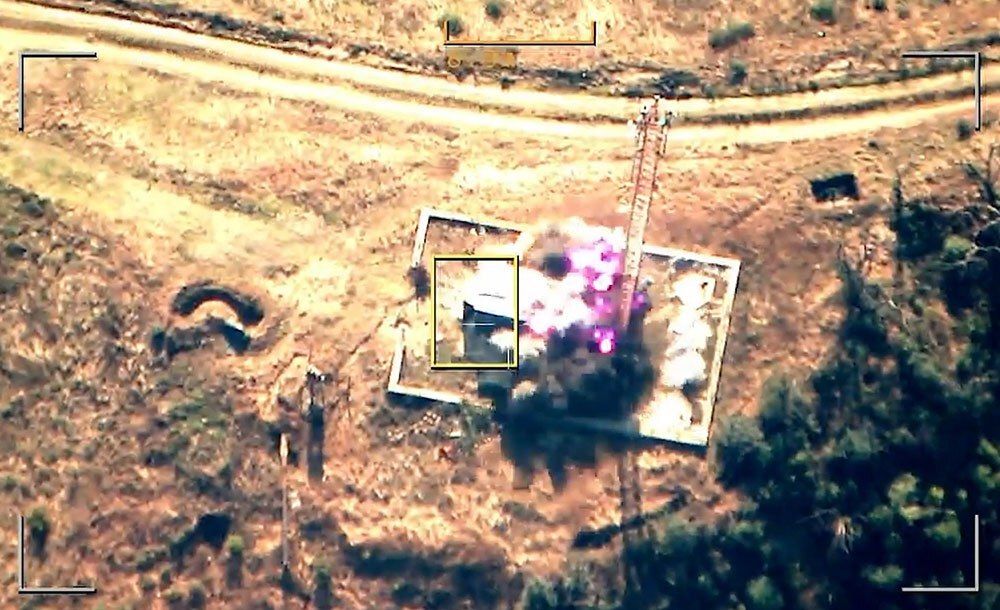Azerbaijan attacks disputed Nagorno-Karabakh region, breaking cease-fire
The 'local anti-terrorist' strikes in the ethnic Armenian enclave threaten to reignite a war with implications for Russia, Turkey and the West


A free daily email with the biggest news stories of the day – and the best features from TheWeek.com
You are now subscribed
Your newsletter sign-up was successful
Azerbaijan on Tuesday launched an attack on Nagorno-Karabakh, a mountainous semi-autonomous region populated by 120,000 ethnic Armenians, threatening to reignite a late-Soviet-era conflict that now involves Turkey, Russia and the West.
Azerbaijan said it was conducting "local anti-terrorist activities" inside Nagorno-Karabakh after landmines killed six Azerbaijani military personnel. But reports from the region indicated heavy shelling, missile strikes and a full-scale assault, and Azerbaijan's military and presidential administration suggested the assault will not end until the breakaway ethnic Armenian administration surrenders and submits to the authority of Azerbaijan's government.
Authorities in Nagorno-Karabakh said 25 people, including two civilians, were killed in Tuesday's attack.
The Week
Escape your echo chamber. Get the facts behind the news, plus analysis from multiple perspectives.

Sign up for The Week's Free Newsletters
From our morning news briefing to a weekly Good News Newsletter, get the best of The Week delivered directly to your inbox.
From our morning news briefing to a weekly Good News Newsletter, get the best of The Week delivered directly to your inbox.
Nagorno-Karabakh is inside Azerbaijan's internationally recognized borders, but Armenia won control of the region after years of bloody conflict between the two Soviet states from 1988 to 1994. Most of the Azeri population was driven out in those wars, and Armenians held the region until Azerbaijan, backed by Turkey, won back much of the area in a 2020 war that ended only when Russia stepped in and brokered a cease-fire.
About 90,000 ethnic Armenians were driven out in the six-week war in 2020, and the cease-fire was bolstered by about 2,000 Russian peacekeepers in Nagorno-Karabakh. Tensions had been mounting since December, when Azerbaijan effectively cut the region off from its sole route to Armenia, leading to shortages of food, medicine and fuel. Western-backed talks this year had held the promise of turning the cease-fire into a permanent peace, but analysts said that with Armenia's Russian backers tied up in Ukraine, Azerbaijan is taking its shot at capturing the entire region.
The "geopolitical alignments in the region are complex," The New York Times explained. "Azerbaijan's closest ally, Turkey, is a NATO member. Armenia has a military alliance with Russia, while Prime Minister Nikol Pashinyan of Armenia has sought to deepen ties with the West. In the 2020 war, there was widespread disappointment in Armenia that Russia did not come to the country's aid more assertively." The U.S. and Russia both urged Azerbaijan to abide by the 2020 cease-fire.
A free daily email with the biggest news stories of the day – and the best features from TheWeek.com
Peter has worked as a news and culture writer and editor at The Week since the site's launch in 2008. He covers politics, world affairs, religion and cultural currents. His journalism career began as a copy editor at a financial newswire and has included editorial positions at The New York Times Magazine, Facts on File, and Oregon State University.
-
 The environmental cost of GLP-1s
The environmental cost of GLP-1sThe explainer Producing the drugs is a dirty process
-
 Greenland’s capital becomes ground zero for the country’s diplomatic straits
Greenland’s capital becomes ground zero for the country’s diplomatic straitsIN THE SPOTLIGHT A flurry of new consular activity in Nuuk shows how important Greenland has become to Europeans’ anxiety about American imperialism
-
 ‘This is something that happens all too often’
‘This is something that happens all too often’Instant Opinion Opinion, comment and editorials of the day
-
 US, Russia restart military dialogue as treaty ends
US, Russia restart military dialogue as treaty endsSpeed Read New START was the last remaining nuclear arms treaty between the countries
-
 What happens now that the US-Russia nuclear treaty is expiring?
What happens now that the US-Russia nuclear treaty is expiring?TODAY’S BIG QUESTION Weapons experts worry that the end of the New START treaty marks the beginning of a 21st-century atomic arms race
-
 Epstein files topple law CEO, roil UK government
Epstein files topple law CEO, roil UK governmentSpeed Read Peter Mandelson, Britain’s former ambassador to the US, is caught up in the scandal
-
 Iran and US prepare to meet after skirmishes
Iran and US prepare to meet after skirmishesSpeed Read The incident comes amid heightened tensions in the Middle East
-
 Which way will Trump go on Iran?
Which way will Trump go on Iran?Today’s Big Question Diplomatic talks set to be held in Turkey on Friday, but failure to reach an agreement could have ‘terrible’ global ramifications
-
 Israel retrieves final hostage’s body from Gaza
Israel retrieves final hostage’s body from GazaSpeed Read The 24-year-old police officer was killed during the initial Hamas attack
-
 China’s Xi targets top general in growing purge
China’s Xi targets top general in growing purgeSpeed Read Zhang Youxia is being investigated over ‘grave violations’ of the law
-
 Ukraine, US and Russia: do rare trilateral talks mean peace is possible?
Ukraine, US and Russia: do rare trilateral talks mean peace is possible?Rush to meet signals potential agreement but scepticism of Russian motives remain
